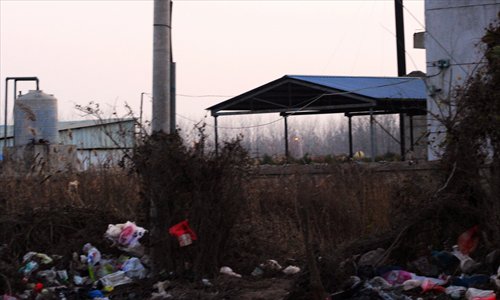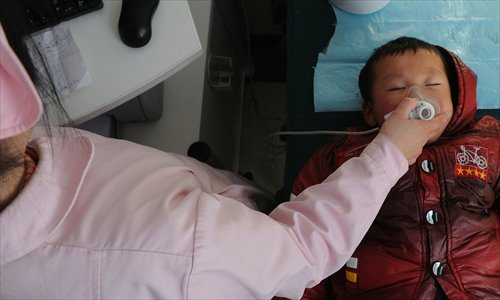HOME >> CHINA
Undeveloped areas often victims of lead pollution: research
Source:Global Times Published: 2014-12-22 19:03:01

A garbage dump outside Chaowei Power, a manufacturer of lead-acid motive batteries in Jiangsu Province in 2010 Photos: CFP

A child suffering from lead pollution under medical treatment in Anhui Province in 2011 Photo: CFP
It is a long bus ride for 80-year-old villager Zhang Zhongzhu, who lives in Wengyuan, a remote county in northern Guangdong Province, to visit his great-grandson Fubao who is receiving treatment for lead poisoning at the city hospital.
A blood test in November showed that lead levels in 2-year-old Fubao's body hit 230 micrograms per liter, two times higher than the national health standard, which says that the level of lead for children should not be more than 100 micrograms per liter of blood.
The accumulation of lead in the human body can damage the nervous system and cause anemia. At the hospital, watching Fubao walk awkwardly, Zhang could not conceal his concern.
As of December 3, nearly 270 children in Wengyuan have been confirmed to have excessive amounts of lead in their blood, Beijing-based Minsheng Weekly reported. The number may increase because the full blood test results for the rest of the nearly 6,000 people living in Tielong Tree Farm have not yet been published.
Fears have grown at the farm, especially among parents. Some parents don't want to disclose their children's test results in the neighborhood. They are afraid that lead contamination will affect a child's future marriage since "lead poisoning can lead to infertility."
After the massive contamination, the Wengyuan county government suspended production at all six plants that use lead in the area and started an investigation.
It is not the first time that lead contamination cases have been discovered in China.
According to research conducted by a team under Lü Zhongmei, president of Hubei University of Economics, 44 lead pollution incidents occurred in 17 different regions in China between January 2004 and December 2013.
Most of the pollution incidents have led to human poisoning cases, the study Lü released on June 9 said.
The team also found that 80 percent of those cases occurred in underdeveloped areas, and local environmental authorities often failed to detect the pollution.
Breakout
Tielong Tree Farm, as Minsheng Weekly reporter observed, is surrounded by an industrial park with heavy metal factories, cement producers, quarries and waste disposal plants, and many villagers, instead of farming like their fathers' generation, are employed in those factories.
As villager Wang Hong remembered, those mineral and heavy metal companies started to move in 10 years ago, and the air started to be filled with dust. Later, villagers found that the millet grown in the field turned black.
"For years, we have complained to the farm administrators and the factories in the industrial park about the pollution in the air and the rivers," said Wang. "But there was no evidence."
Hidden danger
Nobody thought about lead contamination until October 22, when more than 100 villagers, including adults and kids, went to a local health clinic for nausea and vomiting.
An investigation by the Wengyuan Environmental Protection Bureau and Disease Control Center concluded that the massive breakout of stomach pains was caused by excessive coliform bacteria in drinking water.
Villagers did not believe this conclusion. "There are separate water sources, but why did the problem occur on the same day?" villagers asked.
Zhao Lanpin, Fubao's mother, thought of lead contamination. "Last year I heard that there were kids in the village being tested for excessive amounts of lead, but I thought it was only accidental."
At the end of October, Zhao and more than 10 other parents had their children's blood tested. On November 4, results confirmed that all the children had excessive amounts of lead in their blood.
Five days later, over 100 angry villagers protested outside the offices of tree farm administrators, holding a banner saying, "Give us back the clean Tielong tree farm, [we want to] be healthy Tielongers."
The main road through the tree farm was blocked that day. Villagers' request was simple: fully inspect the air, soil and water quality in the tree farm and move all the factories out, according to Wang, who added that villagers don't mind going back to their farming lives.
After negotiating with protesters, the Wengyuan county government ordered the six factories using lead to suspend production and formed a work team to accompany villagers to perform blood tests.
Lack of supervision
To ensure that the factories would not operate secretly, Wang and other villagers erected tents in front of the factories' gates and brought sand and stones to block the entrances.
Guo Mingkai, a villager working at the industrial park, revealed that every time the county government went to inspect the factories, the companies would receive government notices in advance, so they would suspend production and prepare for the upcoming inspection.
Bao Zhonggu, an official with the Wengyuan Environmental Protection Bureau, denied this, saying that the bureau would inspect companies' discharge every three months without notifying companies.
Many villagers think that the reason factories chose to locate in Tielong Tree Farm was not only convenient transportation, but also because the tree farm is located in a remote mountain area that lacks local environmental supervision.
According to Zhao, villagers are worried about the fact that the pollution source cannot be located without thorough investigation of the factories. Zhao also worries about whether these polluters will be regulated in the future.
To make the county governments attach more importance to this issue, villagers have started to collect signatures to voice their requests.
Remote villagers victimized
What happened in Tielong is not an outlying case.
This June, a chemical plant was shut down on suspicion of causing lead poisoning in more than 300 children in Hengdong county in Hunan Province. However, at least one local official contended that the lead poisoning might come from the children "biting pencils."
Lü, who has studied environmental pollution in China for years, told Beijing-based Legal Weekly that such contamination happens nearly every year, and the rates of heavy metal pollution have not been curbed.
According to Lyu's report, heavy metal pollution cases are concentrated in Hunan, Jiangsu, Zhejiang and Guangdong provinces. This is correlated to the distribution of China's lead and zinc metal production plants.
The main reason for this is illegal discharge from companies, Lyu added.
Nearly 80 percent of pollution cases in the past 10 years have been in the countryside, and nearly 90 percent of cases were caused by long-term accumulation of pollution, Lyu said.
Ma Jun, head of the Institute of Public and Environmental Affairs, an NGO that researches pollution in China, said that local enterprises are usually the most important source of government revenue and the biggest employers in underdeveloped areas.
"So the problem cannot be solved without full supervision from both local governments and villagers,"Ma added.
Newspaper headline: Poisoning a village
Posted in: Society